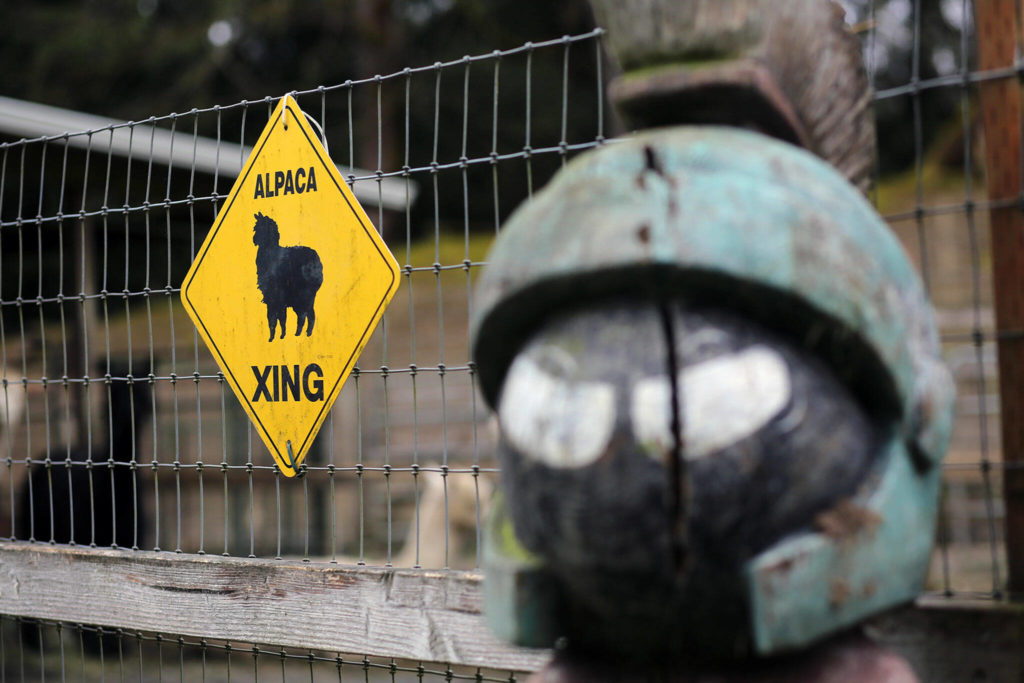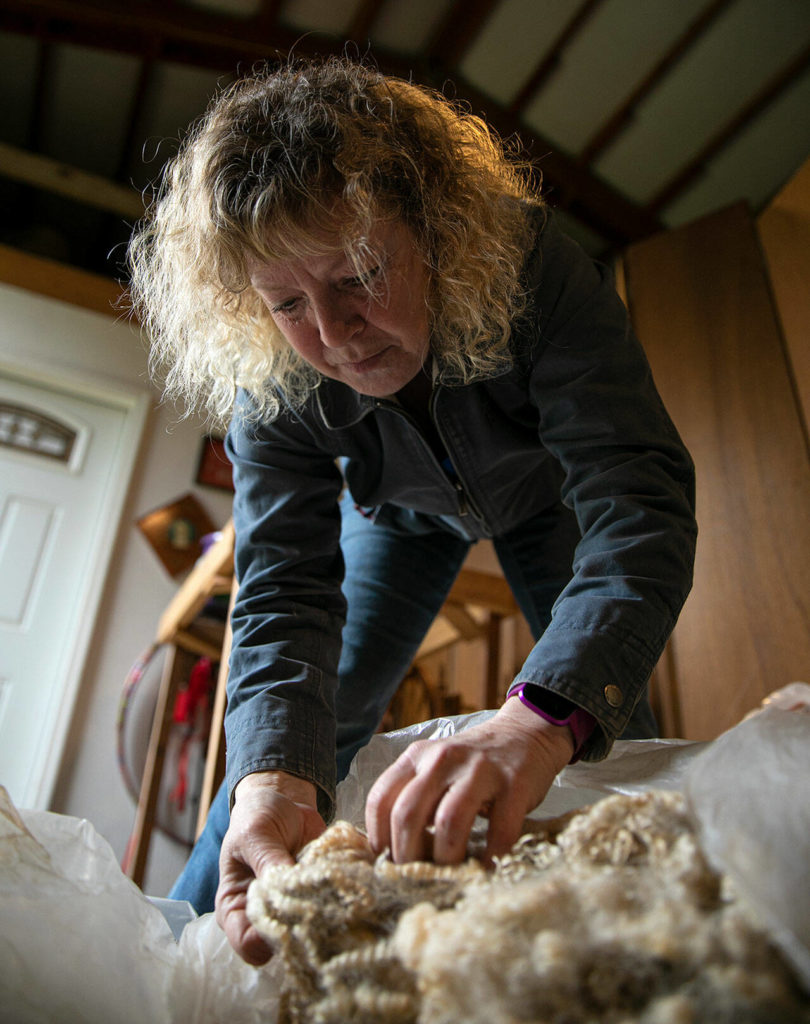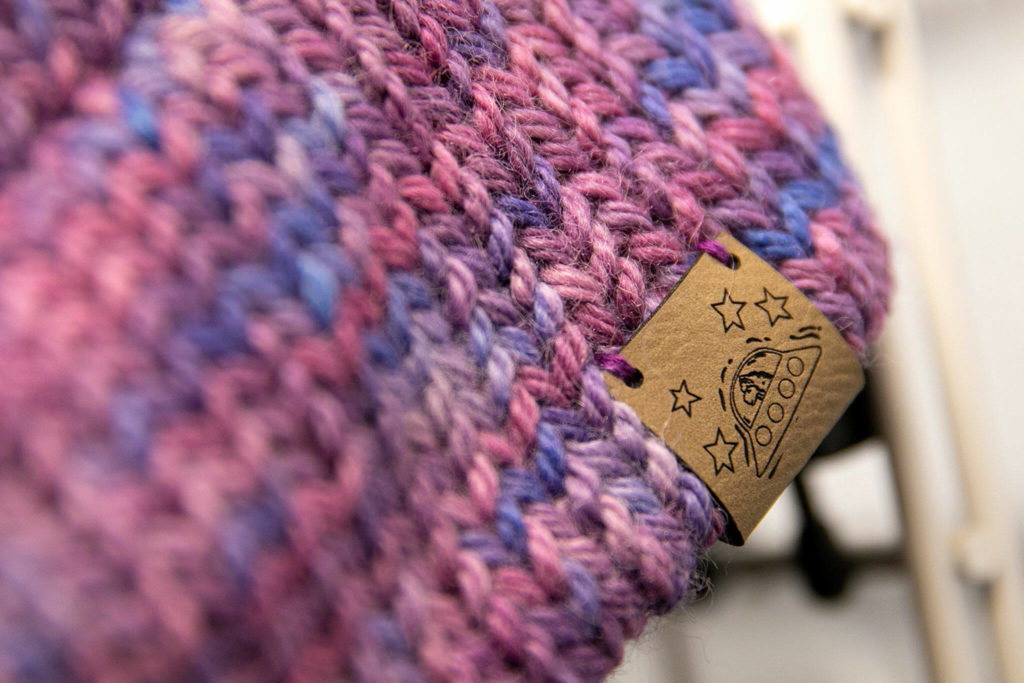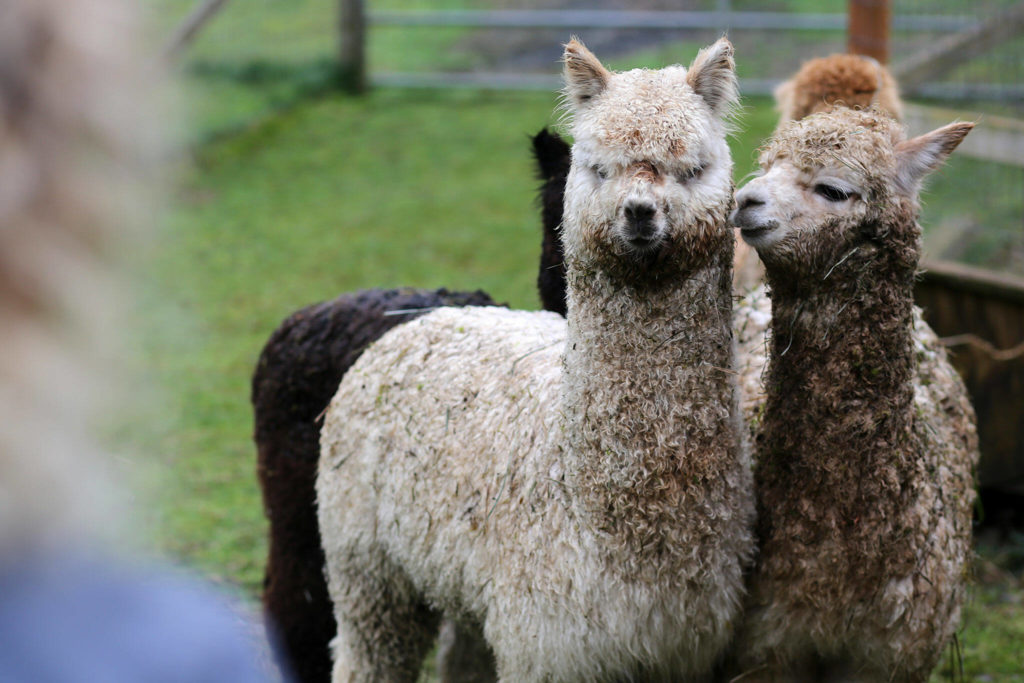Friends and family were taken aback by the news.
In 2000, Rebecca Suryan and her husband decided to sell their house in the Lynnwood suburbs, move out to the country and start an alpaca ranch.
“They thought we were nuts,” Suryan said. At the time, she was a stay-at-home mom and had no experience raising livestock.
Two decades later, Suryan, 59, has grown her alpaca herd from two to nearly 40. And after putting two kids through college with alpaca money, she said, her loved ones “quit wondering what the heck we were doing.”
The ranch, Alpacas from MaRS, sits on 6 acres outside Snohomish. The name of Suryan’s enterprise was coined by her husband, Mark, and is an acronym of the couple’s initials.
Beyond the name, the martian theme extends to the ranch’s logo: an alpaca piloting a flying saucer. And watching over the property’s entrance is Marvin the Martian, a wooden statue that Suryan’s sister gifted to them. A few months ago, it lost a foot after weathering the elements for 20-plus years.
Marvin stands guard next to the wire-fence lots, home to Suryan’s lounging alpacas. Each one is named after a land formation on the red planet, such as Annapolis, Elysium, Flurry’s Gale, Zulanka and Andina’s Rose Pearl. The South American mammal is larger than a sheep but smaller than a llama, which they’re commonly mistaken for.
Personality-wise, Suryan said alpacas are like cats. It takes time to build trust, and even then they can be fickle.
“They might come up to you and five minutes later, they don’t want anything to do with you,” Suryan said. “They’re not like a goat where they’re going to bound right over and want all these pets and loves and stuff like that. You have to earn it.”
Suryan said her herd is indifferent to her existence, a sign of respect in alpacas. They’re suspicious of strangers, much to the disappointment of one Herld writer who felt uncomfortable with their watchful stares. Judging him.
During a visit one alpaca let out a screech and his group huddled into a defensive position: They weren’t yet comfortable with Suryan’s farm dog, who had gotten within eyesight.
Alpacas will grunt and snort – even spit – when angry. Suryan has been spat on before, usually when she gets in the middle of two alpacas during an “escalated argument.”
“It’s so nasty,” she said.
Rage spit aside, alpacas are typically peaceful. The larger the group the more relaxed they are, according to Suryan. Alpacas are quiet, though their default noise is a “hmmmmmm”. To clarify, it’s like a humming sound. And yes, it is adorable.
Once a year Suryan shears her alpacas and sends the fleece off to market. Do they enjoy it?
“No,” she said, without hesitation. But the alpacas will have an “aha moment” when they come to understand what’s happening and relax. Suryan said the biggest chunk of fur – dubbed the blanket – comes from the main part of the body and produces about three to six pounds of fiber a year.
Alpaca fleece comes in 22 natural colors. The fibers can be dyed, spun into yarn and knitted into hats, socks and other apparel. Some of these are produced by manufacturers like Pendleton Woolen Mills in Oregon. But other products Suryan makes herself and sells at farmers markets and on Etsy.
Suryan leads farm tours, arts/crafts workshops and even hosts alpaca-themed birthday parties on the property. Ever wanted a photoshoot with an alpaca? Alpacas from MaRS offers just that for $100 an hour. Suryan said her herd also makes for popular set dressing at engagement and graduation shoots.
Suryan volunteers with local 4-H Clubs, in which students can partner with one of her alpacas and help care for it. Sometimes they’ll even enter the alpacas into competitions and run them through obstacle courses. It’s all in an attempt to teach the students responsibility and spread the alpaca love.
Ask Suryan any question about alpacas and she’s bound to know the answer.
How long do alpacas live for? About 15 to 20 years.
How long is an alpaca pregnant for? Nearly a year, but it varies from 11 to 12 months.
Can you pet them? Sure, but on the neck is preferred. Suryan said alpacas don’t like the top of their heads touched.
Suryan is a human encyclopedia on everything alpaca, but she wasn’t always that way. She first encountered the camel’s fluffy relative at the 1997 Washington State Fair in Puyallup.
“We had no idea what they were,” Suryan said. Still, she was captivated. Two years later the couple got their first alpacas and Suryan never looked back.
“We just wanted a lifestyle change at that point,” Suryan said. “I like working with the animals, being around them. It’s not the same old thing day in and day out, like an office job.”
Throughout the years Suryan has encountered plenty of learning curves. She was able to seek advice from the supportive, albeit small, alpaca breeder community that has grown over the years.
“Alpacas are kind of a cool thing these days,” she said. “They’re cute.”
Today, about 265,000 alpacas in the United States are registered with the Alpaca Owners Association. Just over 7%, or about 18,500, live in Washington. It’s a small amount compared to the 92 million cattle, 5 million sheep and 2.58 million goats that reside in the country, per the U. S. Department of Agriculture.
This summer Suryan will see her seventh generation of alpacas born on her ranch. She plans to continue breeding alpacas for the foreseeable future and wants to introduce “the next generation” to the animal.
Suryan often finds herself just watching her herd. Sometimes the boys will roughhouse and the girls squabble, but for the most part Suryan’s alpacas are calm.
“They’re enchanting,” she said. “They’re just easy to be around.”
To schedule a visit to Alpacas from MaRS, visit alpacasfrommars.com.
Eric Schucht: 425-339-3477; eric.schucht@heraldnet.com; Twitter: @EricSchucht.
Washington North Coast Magazine
This article is featured in the summer issue of Washington North Coast Magazine, a supplement of The Daily Herald. Explore Snohomish and Island counties with each quarterly magazine. Each issue is $3.99. Subscribe to receive all four editions for $14 per year. Call 425-339-3200 or go to www.washingtonnorthcoast.com for more information.
Talk to us
> Give us your news tips.
> Send us a letter to the editor.
> More Herald contact information.































